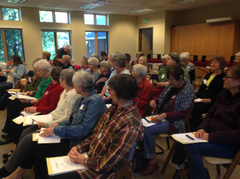 Did you ever wonder where the adult Sunday School classes and Forums came from? You know that each Sunday during the Education For All Hour we offer a variety of opportunities for adults, as well as a full complement of children’s and youth classes. There are generally two “Study Groups,” classes that run usually for six weeks, and a “Forum," where the program changes weekly. The Forums are a longstanding tradition at Plymouth. For the last couple of years, we have aimed to build them around a monthly theme. So while each session stands alone, a person benefits from attending all the programs during a month. Ideally, the first week of the month we lay a theological foundation for the ensuing weeks. Why is this topic important to discuss at church? What are concepts or values from our theological toolkit of scripture, tradition, and contemporary spiritual reflection that help us address this set of issues? How does discussing this issue in our community of faith differ than if we were discussing the same issue at the Rotary Club? Then the ensuring weeks we dig deeper into the issue, often bringing in speakers from the wider community. We almost always have time for questions and discussion in the class, to hone our understandings. The Forum is at the west end of the building towards the memorial garden and labyrinth, through the art gallery. The Forums are planned by the Forum Ministry Team. The church staff annually sketches out the monthly topics, and the ministry team fills in the detailed programs. They meet roughly monthly to flesh out the programs. There is often a lot of creative discussion about how to approach a topic, and then a lot of brainstorming about appropriate resource people. The team is currently pretty small –- Ken Freese, Bruce Rhonda and Ken Klopenstein -– so would love to have some others join them (particularly some women and some younger people!). See any of them or me if you’re curious about our work or want to join. The other two offerings each week we call “Study Groups.” These generally run for six weeks, and use a variety of resources for content. Often there are books to read and discuss, sometimes they use video or web based curricula, or a class built around presentations and guest speakers, so the format varies widely. We work to have balance between three broad areas: spiritual, personal and social. Some topics are “spiritual” broadly construed –- theology, Bible, spiritual practices, or church life. Some topics are “personal” -– for example, relationships, parenting, recovery, or aging. And others are “social” – economics, environment, politics or social justice issues. I like to have co-leaders, or even a small team, to lead these classes, which provides coverage for absence and different teaching/learning styles. One of the classes is in the North Adult Ed Room, the first room on the left as you go down the north hallway; and the other is in the Fireside Room (which also houses our renewed library, watch for its grand opening for circulation!) east of the Fellowship Hall, with entrances off the front lobby. While once upon a time there was a monthly committee meeting to plan these classes, for the last several years we have found that having an annual half day workshop works better. People who have an idea for a class they’d like to offer, and people who want to help shape our offerings, gather together. They consider ideas people bring (and I bring a variety of other options to help prime the pump), give-and-take, pray, talk about the needs of the congregation, prioritize and work out the schedule for the coming program year. This year’s workshop, to plan the 2018-19 year, is Saturday, May 5 from 10 am to 3 pm in the Forum Room. We’ll have a light lunch together; if you’d like to participate in this workshop, please RSVP to me, [email protected]. All these programs are in our Education For All Hour, from 10:00 – 10:50 a.m. between our two worship services. An ongoing issue is being able to begin the classes and Forum on time, which trims our “50 minute hour” to 45 or even less. That makes it hard to do justice to the material, and does not respect the time and commitment of outside speakers who have come to present for us. So I’d encourage you to be on time. If you’ve come to the 9:00 a.m. worship service, move with all due speed from worship to class. (And encourage your children to do likewise.) This will enable everyone to get maximum benefit from the classes. One potential remedy for this challenge is for us to increase opportunities outside the traditional Sunday School hour. I would love to see us offer classes on a weekday evening, where there would be an hour-and-a-half together. This would let us explore material in more depth, and develop groups with greater trust and intimacy with greater potential for transformation. Talk to me, or the chair of the Christian Formation Board, Mari Strombom-Johnson if you’d like to explore expanding our offerings. I love that Plymouth is a community that values adult learning. The Formation Board explicitly includes adults in its mission, and we believe that Christian learning, growth and action (in other words, “Formation”) takes place throughout our entire life cycle. The board’s mission statement provides a great summary of what we want to accomplish through these programs: Rooted in the progressive Christian tradition of the U.C.C., the Christian Formation Board and its ministries teach, challenge, and equip Plymouth's worshiping community of children, youth, and adults to develop a lifelong transforming relationship with God that inspires action towards peace and justice for all of creation. Peace, Rev. Dr. Mark Lee Director of Christian Formation (Adults) AuthorThe Rev. Dr. Mark Lee brings a passion for Christian education that bears fruit in social justice. He has had a lifelong fascination with theology, with a particular emphasis on how Biblical hermeneutics shape personal and political action. Read more about Mark.  We know love by this, that [Christ] laid down his life for us — and we ought to lay down our lives for one another. How does God's love abide in anyone who has the world's goods and sees a brother or sister in need and yet refuses help? Little children, let us love, not in word or speech, but in truth and action. I John 3:16-18 This past Sunday was Plymouth’s celebration of Environmental Sabbath and this coming Sunday is the day celebrated nationally as Earth Day. Spring is “springing” here in Colorado with daffodils, trees budding, warmer temps on many days – though we know the reality of spring snow storms here! In my sermon this past Sunday I shared a quote from 8th century theologian, John of Damascus. “The whole earth is a living icon of [a window onto] the face of God." Taking this to heart we open our hearts to glimpse the face of God in the daffodils, the budding leaves and even in the snow. Taking this to heart is challenging, as well as inspiring. How to see the face of God in hurricanes and floods, as well as in sunny beaches and rolling streams? It is a challenge worth the endeavor as we care for creation as well as enjoy it. Recently I ran across some advice for human communities in a meditation on the communities of geese. A flock of geese as a “living icon” of the communal, three-in-one, face of God. See what you think: Why Geese Fly in Formation Next fall when you see geese heading south for the winter flying along in a "V" formation, you might be interested in knowing what science has discovered about why they fly that way. It has been learned that as each bird flaps its wings, it creates an uplift for the bird immediately following. By flying in a "V" formation, the whole flock adds at least 71% greater flying range than if each bird flew on its own. People who share common direction and sense of community can get where they are going quicker and easier, because they are traveling on the thrust of one another. When a goose falls out of formation, she suddenly feels the draft and resistance of trying to go it alone, and quickly gets into formation to take advantage of the lifting power of the bird immediately in front. If we have as much sense as a goose, we will stay in formation with those who are headed the same way we are going. When the lead goose gets tired, she rotates back in the wing and another goose flies point. It pays to take turns doing hard jobs. The geese honk from behind to encourage those up front to keep up their speed. An encouraging word goes a long way. Finally, when a goose gets sick, or is wounded by a gun shot and falls out, two geese fall out of formation and follow her until she is either able to fly or until she is dead, then they launch out on their own or with another formation to catch up with the group. If we have the sense of a goose, we will stand by each other like that. Friends of God at Plymouth, let us love, not in word or speech, but in truth and action, following the example of our brother and sister geese. Blessings this week on your journey into community with God, Jane Anne AuthorThe Rev. Jane Anne Ferguson, Associate, Minister, is a writer, storyteller, and contributor to Feasting on the Word, a popular biblical commentary. She is also the writer of sermon-stories.com, a lectionary-based story-commentary series. Learn more about Jane Ann here. |
Details
|
 RSS Feed
RSS Feed